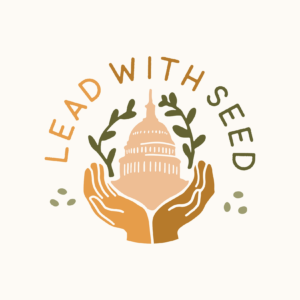
A group of organic farmers and sustainable agriculture advocates recently convened at Nature and Nurture Farm outside Ann Arbor, Michigan to discuss the upcoming 2023 Farm Bill. Special guests at the event included a regional manager from Senator Debbie Stabenow’s office, and a field representative from Congresswoman Debbie Dingell’s office. The congressional staff gave an update on the current negotiations happening in Washington D.C. and around the country, and attendees were able to offer suggestions or share their experience with federal agricultural policies. [For an overview of the Farm Bill, and to understand why it is urgently being discussed amongst agriculture communities throughout the nation, check out this primer from our partners at the National Sustainable Agriculture Coalition.]
One of the primary topics that was discussed at the meeting was federal research and agricultural education programs. In many instances, organic seed producers, independent plant breeders, and growers interested in transitioning to the organic agriculture industry rely on technical support and basic research that is supported by the U.S. Department of Agriculture. While research and extension only makes up a tiny fraction of the overall Farm Bill spending, the impact can be significant. According to a recent figure cited in a press release from Senator Stabenow, every $1 invested in agriculture research returns $20 to the American economy.
During the comments, several pieces of legislation were mentioned that relate to agricultural research. One example is the Organic Science and Research Investment Act, which would increase funding for the Organic Agricultural Research and Extension Initiative program, among other changes. Another more specific piece of legislation is the Seeds and Breeds for the Future Act, which would increase support for the development of regionally-adapted and publicly available cultivars. Many of the farmers present at the meeting agreed that increased investment in research and technical assistance for organic farmers is needed in order for suppliers to keep up with consumer demand.
Other issues that were brought up included the expansion of the organic cost share assistance program, which helps organic producers reduce their costs associated with certification fees, and innovation in urban agriculture, which has been a program that Senator Stabenow has advocated for strongly during her service on the Senate Committee on Agriculture, Forestry and Nutrition. In addition, several speakers mentioned their successful utilization of the EQIP program, which among other things, provides funding for hoop houses and practices that conserve or improve natural resources on working lands. With all of these proposed changes, it is essential that issues of inequality and historic discrimination be addressed by the USDA.
Organic Seed Alliance advocates for policies that support organic agriculture and farmers’ rights to save seed. This year, OSA published an updated Policy Platform for Seed. We encourage you to explore this platform, and to take action in your own community by joining us in our advocacy efforts. For background on the policy platform, also check out the 2023 State of Organic Seed Report, which includes surveys and statistics that informed the policy platform.
There are countless organizations actively involved in shaping Farm Bill policies, so if you are feeling inspired to take action, there are resources and opportunities available. If you want to get directly involved in farm bill advocacy, one way to start is by visiting the National Organic Coalition website, where they offer instructions for contacting your representatives, or you can subscribe to their action alerts to receive timely invitations to share feedback with lawmakers on policies affecting organic agriculture.
If you are interested in joining an online network of organic seed policy advocates, consider joining or returning to the Organic Seed Commons network, where there is a dedicated space set up to discuss seed policy. We were able to offer this event thanks to funding from Farmers Advocating for Organic (FAFO). If you have any questions about this event or the resources shared in this article, feel free to contact Michael Lordon at michael@seedalliance.org.
